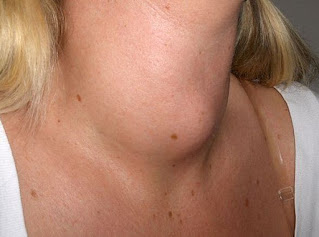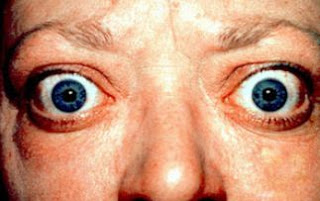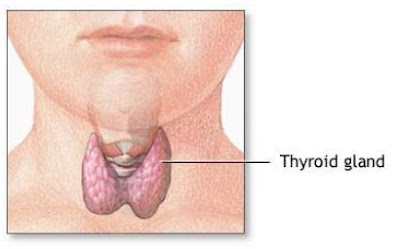INTRODUCTION
For a healthy metabolism, development of bones, to repair the damaged cells iodine required. The iodine improves thyroid health, reduces the intensity of goiter, improves cognitive activity, birth weight, etc.
Iodine chiefly accumulated in the thyroid gland. A healthy adult body comprises of 15-20 mg of iodine, 70-80% of which stocked in the thyroid gland.
Iodine is primary for the Thyroid gland to discharge thyroid hormones. These hormones manage the body's metabolism and many other functions. The body also demands thyroid hormones for proper bone and brain growth during pregnancy and infancy.
SHAPE AND LOCATION
The Thyroid gland discharges metabolic hormones that help in the growth and development of bones in kids and teenagers and in the development of the brain and nervous system. The shape of this gland compared to a butterfly or bow tie.
Image Source : Wikimedia Commons
LOCATION OF THYROID GLAND
Image
Source : Wikimedia Commons
This gland is in the part of the lower neck/ at the base of the throat attached to the windpipe (trachea) and just below the larynx or Adam’s apple in the neck. It has two lobes separated by the cord of tissue called the isthmus.
BALANCING OF THYROID HORMONES
The hypothalamus secretes the Thyrotropin-releasing hormone indicating the pituitary gland to produce thyroid-stimulating hormone (TSH). Thus, TSH triggers the thyroid gland to produce thyroid hormones.
The Pituitary gland manages the release of TSH based on the levels of thyroid hormones that flows in the blood. Thus, the level of the thyroid hormones balanced.
HORMONES AND ITS FUNCTION
The Thyroid hormones manage the rate at which cells ignite the fuels from food to make energy. The higher the thyroid hormone in the bloodstream, the quicker chemical reactions happen in the body.
The thyroid gland digests iodine from the food and produces hormones. The secreted hormones are stored in the glands and used whenever demanded by the target cells since these hormones travel the entire body via the bloodstream.
The two chief hormones of thyroid glands are:
- T3 - Tri-iodothyronine
- T4 - Thyroxine (tetraiodothyronine)
T3 and T4 hormone manage the rate of metabolism of carbohydrates, fats, and proteins in the body. T3, T4 hormones are necessary for the typical development and metabolism of the body. Thyroxine controls the size of the body. Both hormones have iodine.
The tasks of the thyroid gland are:
- Maintains internal homeostasis
- Controls breathing and heartbeat rate
- Monitors body weight
- Thyroid hormone balances or tunes the internal body temperature and cholesterol levels.
- The function of the lobes of the thyroid gland is to synthesize the thyroid hormone.
Around 95 percent of the thyroid gland is thyroxine, and the persisting 5 percent is Tri-iodothyronine. T4 converts into T3 this process occurs in the liver and other tissues according to the requirement of the body.
DISORDERS
The disorders or diseases occur at any age group because of injury, dietary deficiency, abnormal thyroid growth, levels of secretion (hypo or hyper), thyroid cancer, nodules within the thyroid. The most common diseases are:
1) Goitre: This is an expansion of the thyroid gland (formation of a bulge in the neck). It happens due to an insufficiency of iodine in the diet. The indications are swelling or tightness of the neck, breathing and swallowing difficulties, hoarseness of the voice, and wheezing. Goitre administered either with radioactive iodine doses or by surgery.

GOITRE
Image
Source : Wikimedia Commons


GOITRE
Image
Source : Wikimedia Commons

GOITRE
2) Hashimoto’s Disease or Hypothyroidism: This is a status where the immune system of a patient assaults its thyroid gland. An individual will have a low level of thyroid hormone in the body. In infants, this situation referred as ‘Cretinism’.

6 week old female with jaundice due to hypothyroidism.
Image
Source : Wikimedia Commons


A man with congenital iodine deficiency syndrome
Image
Source : Wikimedia Commons

The consequences of cretinism are abnormal bone formation and mental retardness. The most typical indications are fatigue, mild weight gain, dry skin and hair, depression, pale skin, sensitivity to cold, little appetite, overall sluggishness, and an enlarged goiter.
3) Graves' Disease or Hyperthyroidism: This is due to the secretion of more thyroid hormone than the requirement. A person who suffers from hyperthyroidism is sensitive to heat, hyperactive, and eats excess. Goiter is seldom a side impact of hyperthyroidism.

Graves' Disease
Image
Source : Wikimedia Commons

Graves' Disease
The symptoms include anxiety, fatigue, hand tremors, excessive sweating, trouble sleeping, diarrhoea, goiter, and bulging eyes or vision impairment. The treatments are giving anti-thyroid medications along with radioactive iodine, beta-blockers that will slow the heart rate and anxiety.
4) Thyroid Nodules: This is a condition of formation of growth in the thyroid gland due to a lack of iodine or hypothyroidism. Mostly these nodules are benign but there is a chance to become cancerous. The symptoms are a high heart rate, nervousness, tremors, weight loss, and a big appetite.
5) Thyroid cancer: This affects people of all age groups; particularly people who are above 30 years are likely affected. The symptoms are hoarseness, neck pain, and enlarged lymph nodes.
6) Thyroiditis: This is a condition of swelling of the thyroid gland, which causes abnormal functions of the thyroid gland i.e. kills thyroid cells, unable to produce thyroid hormones.
CONCLUSION
Iodine is a vital mineral generally found in seafood. The thyroid gland utilizes iodine to produce thyroid hormones, which aids in controlling the growth, repairing the damaged cells, and promote a healthy metabolism. Iodine is rich in seafood, dairy products, grains, and eggs.





No comments: